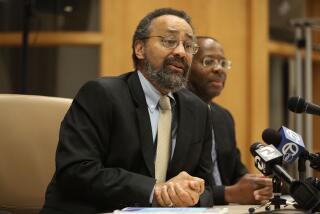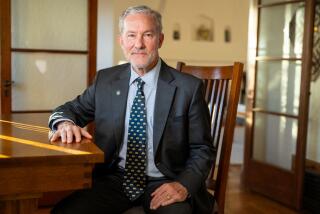William J. Bouwsma, 80; UC Berkeley Professor Was Expert on Renaissance
- Share via
William J. Bouwsma, a UC Berkeley scholar and author on the European Renaissance and its influence on modern culture, has died. He was 80.
Bouwsma, who taught at Berkeley from 1957 until his retirement in 1991, died March 2 at Alta Bates Summit Medical Center in Berkeley of complications from an aneurysm.
One of the historian’s best-known books was the 1988 “John Calvin: A Sixteenth-Century Portrait,” which earned him the book of the year award from the Evangelical Publishers’ Assn.
In reviewing the book for The Times, University of Rochester history professor Donald R. Kelley called it “a richly wise, and splendidly engaging portrayal of a man whose doctrines and aspirations -- and whose anxieties and fears -- shaped, and perhaps are still shaping, the modern world.”
The Christian Science Monitor commended “the shades of pain, wonder, joy and agony Bouwsma reveals in his portrait of Calvin” and added, “To read this book closely is to be brought very close to something original, something pure....” A reviewer for the St. Petersburg Times concluded, “All in all, Bouwsma offers an intellectual tour de force.”
Bouwsma earned equal praise for other books. His 1968 work, “Venice and the Defense of Republican Liberty: Renaissance Values in the Age of the Counter Reformation,” was greeted by the Journal of Modern History as “brilliant, provocative, multi-leveled” and “one of the most important contributions to Renaissance historiography in recent memory.”
His more recent book, “The Waning of the Renaissance, 1500-1640” published in 2000, was praised by a Providence Journal-Bulletin reviewer: “From the title onward ... this long-awaited work by the distinguished historian William J. Bouwsma is a series of surprises, some playful, some profound.”
All of Bouwsma’s books, that reviewer commented, illustrate an approach to the Renaissance that is “consistently intellectual, yet places the Renaissance intellect in a psychological and cultural framework that displays ideas like ripe grapes on a summer trellis, the moment of ripeness yielding suddenly to the moment of rot, sweet and sour a dream apart.”
Bouwsma’s other books included “Concordia Mundi: The Career and Thought of Guillaume Postel, 1510-1581”; “The Interpretation of Renaissance Humanism” in 1959; “The Culture of Renaissance Humanism” in 1973; and “A Usable Past: Essays in European Cultural History” in 1990.
Born in Ann Arbor, Mich., and reared in Lincoln, Neb., Bouswma earned bachelor’s and doctoral degrees from Harvard, with time between for service in the Army Air Forces during World War II.
He taught at the University of Illinois before joining the UC Berkeley faculty in 1957. He was chairman of Berkeley’s department of history in the mid-1960s and early 1980s, and served as vice chancellor for academic affairs from 1967 to 1969.
As vice chancellor, Bouwsma eased the way for more studies of religion, ethnic history and culture in a period when traditional educators resisted the changes.
“Ethnic studies appear relevant as they reflect a coherent ideal of a socially relevant education,” he told The Times in 1969. “They would prepare minority persons to go back to their communities and assume responsibilities for their own people. If this idea is not excessively politicized, it represents the first revival in a long time of undergraduate education with a social emphasis.”
Bouwsma served as president of the American Historical Assn. and the Society for Italian Historical Studies.
He is survived by his wife of 60 years, Beverly; four children, John and Sarah of Portland, Ore., Philip of Guerneville and Paul of Santa Cruz; and six grandchildren.
More to Read
Sign up for our Book Club newsletter
Get the latest news, events and more from the Los Angeles Times Book Club, and help us get L.A. reading and talking.
You may occasionally receive promotional content from the Los Angeles Times.









